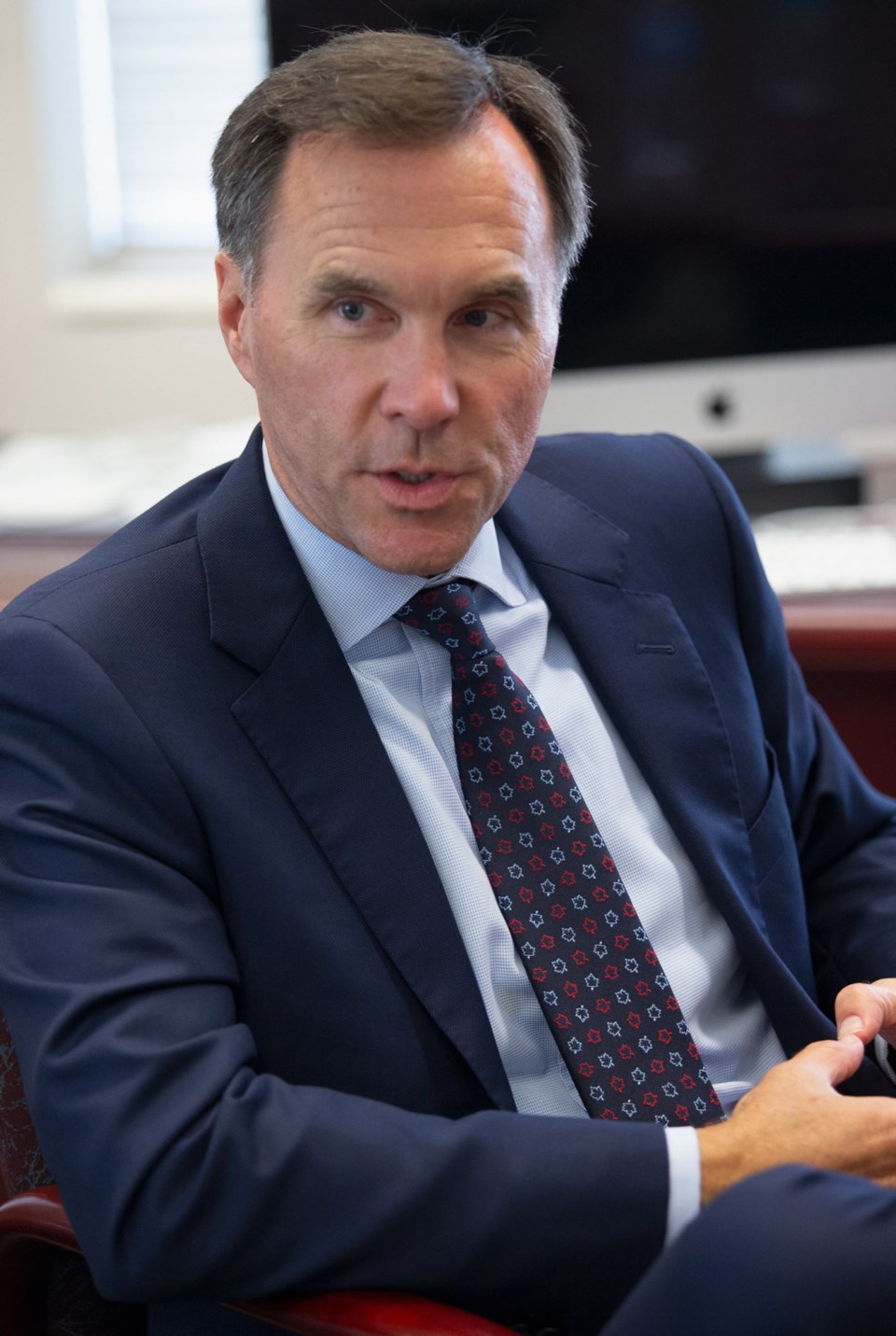Bill Morneau might have knowingly been walking on enemy ground Tuesday, but the federal minister of finance still managed to appreciate the view.
Through the haze of a province on fire, it was not lost on Morneau — on Vancouver Island for a cabinet retreat in Nanaimo — that B.C. remains the envy of other provinces.
“If it were only the case that the rest of the country was doing as well as B.C.,” said Morneau during a sweeping conversation with the Times Colonist editorial board. “When you come to B.C. you get a sense that the economy is doing very well and the nature of business has successfully transitioned to some really interesting and innovative jobs — you can feel it.
“There’s a different sense in B.C. than you had 10 years ago and 20 years ago, for sure, and it’s exciting. It gives you a sense of where Canada might be over the long term.”
Morneau caught a glimpse of that new B.C. economy during a roundtable with local business leaders organized by the Greater Victoria Chamber of Commerce.
While he noted many of the questions and concerns aired during that meeting — the state of negotiations around the North American Free Trade Agreement, tax structure and funding for various programs, to name a few — could have been raised in any city across the country, he said Victoria seemed most charged by the issues felt by an economy firing on all cylinders.
The Conference Board of Canada has forecast B.C. will lead all provinces in gross domestic product growth (3.1 per cent) this year, while Victoria boasts the third-lowest unemployment rate in the country at 4.2 per cent.
Morneau said attracting and retaining labour “animated everyone around the table.”
“The challenge that presents to people thinking about growing a business — hiring people, making sure they can deal with turnover — was a key theme,” he said, noting his visit was more a fact-finding mission than a chance to offer answers.
“What I came to talk about across the country is to try to listen to business people and also to a cross-section of Canadians who would have an insight as to how the economy is doing and to think about how do we continue on the path we’ve been on,” he said.
Morneau said that means the government remains focused on improving the lot of the middle class. “Our concern [when elected in 2015] was the real sense of anxiety among middle-class Canadians and the real cross-section of Canadians who didn’t feel like the opportunities for them and their families were the same for this generation as they were the generation before,” he said.
Morneau said that kind of anxiety leads to things such as Brexit and the change to a more populist government as witnessed in the U.S. “If we don’t deal with middle class anxiety and address concerns, then we won’t be successful in the long term,” he added.
Whether the federal government has adequately assuaged the fears of the middle class will be on the agenda at this week’s cabinet retreat as Prime Minister Justin Trudeau’s Liberals get together a year ahead of the next federal election.
On the agenda with immigration, gun control, NAFTA and carbon pricing will be the Trans Mountain pipeline.
The federal government is at odds with both this province’s NDP government and a chunk of the population over its decision to purchase Kinder Morgan’s Trans Mountain pipeline and push forward with its expansion, which could cost as much as $9.3 billion above the $4.5-billion purchase price.
Morneau said the Liberals’ view of the pipeline as being in the national interest might never sit well with the province.
“We see [the pipeline] as a federal government responsibility to address our long-term issues around environmentally and responsibly ensuring we can deliver our resources to market and get a world price,” he said. “I can’t imagine any other country would want to be extracting resources and getting a significant discount on the price for that because they can’t effectively get it to the international market. If there ever was a time we needed to address the fact we need more than one market, it is now.”
Morneau said the fact the U.S. has increased its energy production and has proven to be a “trading partner with some challenges” has only reinforced the Canadian government’s resolve to act.
As for the environmental argument against expansion, Morneau said the government has put in place the “world class” Oceans Protection Plan. There are also domestic mechanisms to “encourage players in the market to really think about how they can be more environmentally effective in anything they do,” he said.
“There will always be people who don’t agree with us, but we will keep moving forward with this balanced approach to dealing with this.”



